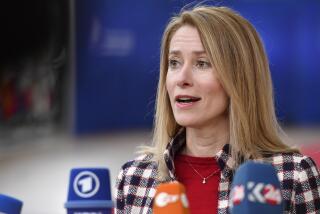EC Leaders Back Monetary Union : But Officials Split on Best Way to Achieve Single Currency
- Share via
MADRID — Leaders of the 12 member nations of the European Community on Monday reaffirmed their commitment to a historic monetary union but clashed on how best to move toward that politically sensitive goal.
Gathered here for a two-day conference, the leaders spent much of Monday debating a controversial three-step plan that would scrap age-old monetary units such as the Greek drachma and the British pound and create a single currency for all 12 nations.
The plan was drafted under the leadership of Jacques Delors, president of the European Commission, and was published in April. Much of its importance stems from the fact that the heads of the 12 central banks helped draft it and endorsed its findings.
It contains no deadline for achieving monetary union, and it did not seem likely Monday that the EC leaders were prepared to set one.
‘Extremely Positive’
While reaffirming their pledge to the idea of monetary union, the 12 leaders differed strongly on how to proceed. French President Francois Mitterrand, supported by his Belgian and Italian counterparts, urged complete and immediate adoption of the Delors report and a firm commitment to a special conference to implement its provisions.
Although one official described the atmosphere at Monday’s summit as “extremely positive,” Mitterrand reportedly threatened at one point to withdraw a French commitment to lift all controls on the flow of capital by next July if any of the other members fail to endorse the report.
The report envisions a federated European central banking system similar to the U.S. Federal Reserve System and a gradual converging of budgetary and economic policies. Exchange rates eventually would be locked and a single currency created.
As an initial step, the report calls on the 12 member countries to join an exchange rate mechanism that at present binds nine of the community’s currencies in rough alignment. The mechanism is the heart of the decade-old European Monetary System.
British Prime Minister Margaret Thatcher, with some support from her Danish and Dutch counterparts, accepted the initial step but argued that more work will be required before the community can commit itself to the subsequent steps.
“We don’t accept (the) Delors (plan) as the only wisdom,” a British spokesman said. “We think we should look at alternatives.”
Although Thatcher rejected key elements of the Delors report, she dropped the dismissive attitude that has characterized many of her recent remarks about the report and the idea of monetary union.
On Monday, she reaffirmed Britain’s commitment to the idea of monetary union and for the first time publicly praised parts of the Delors plan.
“We’re fully behind most proposals in Stage 1 of the Delors report,” a Thatcher aide told reporters.
Under pressure from within the EC and weakened domestically by her party’s poor showing in recent elections for the European Parliament, Thatcher also detailed for the first time the conditions under which the pound sterling would become a part of the exchange rate mechanism.
She said Britain will join the mechanism if progress continues toward the removal of barriers to competition within the EC and controls on capital flow are lifted, as expected, by the end of next year.
Separately, EEC leaders were said to be ready to recommend that the World Bank and other financial institutions suspend loans to China following the military crushing of pro-democracy protests there. Spain’s foreign minister, Francisco Fernandez Ordonez, said the recommendation was included in a statement drafted by EEC foreign ministers and expected to be approved today.
More to Read
Sign up for Essential California
The most important California stories and recommendations in your inbox every morning.
You may occasionally receive promotional content from the Los Angeles Times.













